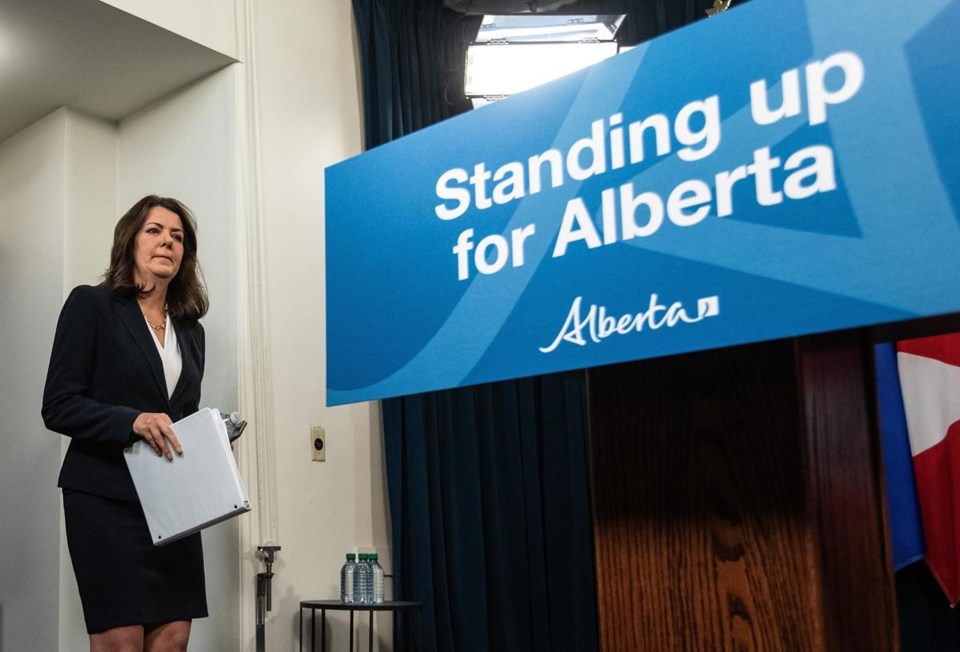EDMONTON — Alberta politicians wrapped up the fall sitting of the legislature in the early hours Thursday, with Premier Danielle Smith’s government cutting off debate to pass a bill mandating a referendum be held before the province could quit the Canada Pension Plan.
Government house leader Joseph Schow said time limits were imposed on the last two stages of debate, because the Opposition NDP had signalled on social media it would try to stall the bill for weeks by making endless speeches about it in the house.
“I’m not in the position as the government house leader to call their bluff and see how late they want to sit,” Schow said Thursday in an interview.
“My job was to get the legislation through (and) get it passed in the most democratic way possible, and so I used a democratic amendment to do exactly that.”
It was a rancorous conclusion to the six-week sitting, the first since Smith’s United Conservative Party won the spring election.
It ended just after midnight Thursday morning with NDP house leader Christina Gray accusing Schow of physically threatening NDP member Rakhi Pancholi, who represents the constituency of Edmonton-Whitemud.
Gray said it happened earlier in debate that night, amid loud cross-aisle shouts and heckling.
Gray told the house, “The government house leader was overheard to say to me, speaking about the member for Edmonton-Whitemud, control her, and — quote — ‘Deal with her or I will deal with her.’”
Gray asked Speaker Nathan Cooper for Schow to be sanctioned under a legislature point of privilege, a serious allegation as it concerns the ability of an elected member to fulfil their duties in the house.
“The member for Edmonton-Whitemud views the comments as a threat,” said Gray.
“It has made her feel unsafe and threatens her ability to perform work as an MLA.”
Cooper told the house he needs time to investigate the accusation and will address it when the house resumes sitting in the new year.
Members found to have breached point of privilege generally make amends by apologizing to the house at a later date.
Schow, asked in the interview about Gray's accusation, said, “There was a lot of back and forth in that instance, but I don’t recall the exact language used.”
He added: “But I can say this with absolute certainty: I would never, nor have I ever, threatened a member of the legislative assembly.
“We are all duly elected by our constituents. We’re equals in that chamber and have every right to debate legislation without fear of any kind.”
The government passed nine bills in the sitting, including the flagship Bill 1, promised by Smith in the election, that requires the government gain majority support in a referendum before hiking personal and business tax rates.
Gray said the sitting will be remembered for the government cutting debate on the pension bill and for another bill that grants Smith’s cabinet authority to alter dollar amounts and rules surrounding gifts to politicians.
“I think that time allocation was used in a heavy-handed manner to shut down debate on issues that the government was uncomfortable continuing to talk about in the legislature,” said Gray in an interview.
“That includes the pensions issue (and) that includes a bill that was giving them the ability to accept bigger gifts, (which is) truly something none of my caucus has ever heard a concern about from our constituents.”
The gift rules currently can only be altered through legislation, but Smith has said the rules and dollar ceilings need to be reworked because they are too restrictive, and impede her and other politicians’ ability to effectively network on behalf of their constituents.
The Opposition focused much of their attention in the sitting on the pension bill, calling it a threat to Albertans’ retirement security. The NDP made multiple amendments to tighten the rules around it, but all were defeated by the UCP majority.
While the bill compels a referendum be held, it also says the government has the option, once it calls the plebiscite, to decide whether it will be legally bound to accept and act on the result.
Finance Minister Nate Horner assured the house Wednesday night the government will respect the results of any referendum.
The bill also states that any money transferred over from the CPP would have to be invested in an Alberta pension plan. But the bill is silent on what happens to income generated from the Alberta plan once it is up and running.
Horner promised all future money would also be reinvested in any Alberta pension plan.
Gray said that is cold comfort for Albertans.
“We have a bill that actually does not — in black and white — do what the government says it will do,” she said.
This report by The Canadian Press was first published Dec. 7, 2023.
Dean Bennett, The Canadian Press



